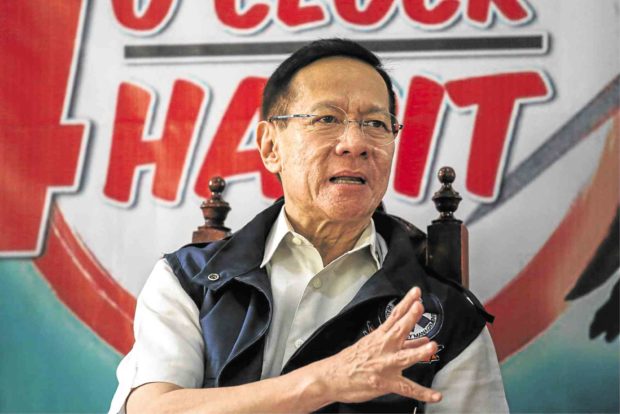MANILA, Philippines — It will be a move that will benefit no one.
Health Secretary Francisco Duque III on Tuesday appealed to private hospitals to renew their Philippine Health Insurance Corp. (PhilHealth) accreditation, saying unilaterally withdrawing their accreditation would lead to a “lose-lose situation.”
The Private Hospitals Association of the Philippines, in an open letter dated Oct. 15 and published on Monday, said its members might not renew their PhilHealth accreditation because many of them had yet to receive their reimbursements from the state health insurer.
There were also hospitals in Mindanao that were stripped of their accreditation because there were complaints against them, the group said.
Duque noted that almost all Filipinos have PhilHealth coverage, and if hospitals gave up their accreditation, they would not be paid by the company.
“PhilHealth cannot pay them. Only patients who can pay will pay them. But why will the patient pay them knowing that he has his benefits right under the PhilHealth law? That’s why it’s a lose-lose situation. It’s not a solution,” Duque told reporters.
Dropping their accreditation could also lead to private hospitals refusing to serve Filipinos, to the people’s detriment, he said.
“So the service to poor Filipinos who need it, especially the sick, will be gone. You will turn your back on the sick? I think that is not right,” Duque said.
“They should not give up their accreditation because that will certainly compromise our capacity to provide much needed health-care services to members of PhilHealth,” he added.
To compromise health care
Duque also said private hospitals shedding their accreditation could compromise the implementation of the Universal Health Care Act.
“The capacity to provide tertiary care to patients, even secondary care to patients who are sick would be compromised,” he said.
“So I appeal that they don’t have their accreditation withdrawn because it’s really going to compromise health care [in] this country,” he added.
According to Duque, the 600 or so government hospitals would not be able to handle all the patients if private hospitals turned them away.
There are some 1,000 private hospitals in the country.
Duque said the private hospitals whose PhilHealth accreditation had been withdrawn had been involved in irregularities, such as fraudulent claims and upcasing of illnesses.
PhilHealth won’t allow itself to be threatened.
Ricardo Morales, the company president, said on Tuesday that PhilHealth would just deal individually with private hospitals that had pending claims with the insurer.
‘Empty boast’
He called the letter signed by Rustico Jimenez, president of the private hospitals’ group, an “empty boast.”
“Individual hospitals … are saying a different thing. It’s only Dr. Jimenez, not those hospitals. [It’s] his personal opinion,” Morales said.
He urged private hospitals that had problems with PhilHealth to contact the company directly, as the insurer would “not entertain any queries” from the association.
In the letter, Jimenez said “many hospitals” had received return notices for “noncompliance [with] standard of care.”
“Writing the PhilHealth back will receive no reply at all or the PhilHealth response is so delayed, leaving the hospital no more time to refile their denied claims,” he said.
Because of this, he said, “many of our members” no longer want to renew their accreditation for next year.
Apart from Jimenez, no other association official was identified in the letter. Of the nine chapter presidents, only three signed it. The rest simply marked it “SGD” or “signed.”
Morales explained that hospitals received return notices because their paperwork was incomplete. In some instances, he said, the claims were questionable.
But he said PhilHealth was not sitting on its job, as it was processing at least a million transactions a month.
The private hospitals’ threat drew a quick response from Congress, where it was seen as an attempt to derail the Universal Health Care Act.
Kalusugan Rep. Michael Defensor on Tuesday said he would introduce legislation that would add penal provisions to the law should the hospitals make good their threat.
Sabotage
Hospitals not filing for PhilHealth accreditation would be tantamount to “sabotaging” the government’s health programs, Defensor said.
“It would be a crime for them not to be part of the universal health care program. The President had wanted to empower the hospitals in order for our citizens to have alternatives due to the high cost of confinement, and now that we are starting to see this become a reality, they take that position. I think that’s bad,” he said.
Defensor said the Universal Health Care Act had no penal provisions for private hospitals that would reject PhilHealth accreditation.
“This is because [all private hospitals] become part of the entire program. Sadly, what is happening now is that PhilHealth seems treated like a hostage,” he said.
Defensor cited many hospitals whose fraudulent claims had led to the suspension or revocation of their PhilHealth accreditation but that had managed to circumvent the law.
“I know of a hospital in Manila that changed its name three times [to escape liability]. But if you try to look at their program on pneumonia, they had 700,000 cases. The year before, they had 800,000 cases, [although] there was never a pneumonia outbreak,” he said. —With reports from Jovic Yee and Melvin Gascon
